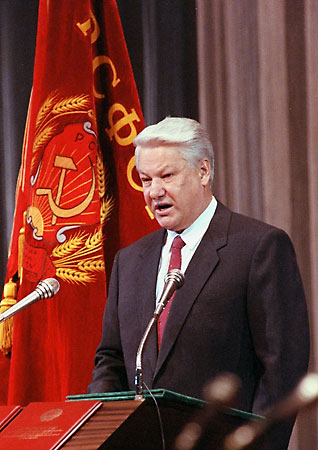Boris Yeltsin

Reference: Click Here
BUY SOUL: $ FREE $
Boris Nikolayevich Yeltsin (Russian: Бори́с Никола́евич Е́льцин (help·info); IPA: [bɐˈrʲis nʲɪkɐˈlaɪvʲɪtɕ ˈjelʲtsɨn]) (February 1, 1931 - April 23, 2007) was the first President of the Russian Federation, serving from 1991 to 1999.
Yeltsin came to power on a wave of high expectations. On 12 June 1991 he was elected president of the Russian Soviet Federative Socialist Republic with 57% of the vote, becoming the first popularly elected president. But Yeltsin never recovered his popularity after a series of economic and political crises in Russia in the 1990s. The Yeltsin era was marked by widespread corruption, economic collapse, and enormous political and social problems. By the time he left office, Yeltsin had an approval rating of two percent by some estimates. [1]
Following the dissolution of the Soviet Union in December 1991, Yeltsin, vowing to transform Russia's socialist command economy into a free market economy, endorsed a programme of price liberalisation and privatisation. As a result, a handful of people were able to enrich themselves while arguably stamping out competitors.[2]
In August 1991, Yeltsin won international plaudits for casting himself as a democrat and defying the August coup attempt of 1991 by the members of Soviet government opposed to perestroika. He left office widely unpopular with the Russian population as an ineffectual and ailing autocrat.[3] He either acted as his own prime minister (until June 1992) or appointed men of his choice, regardless of parliament. His confrontations with parliament climaxed in the October 1993 Russian constitutional crisis, when Yeltsin called up tanks to shell the Russian White House, blasting out his opponents in parliament. Later in 1993, Yeltsin imposed a new constitution with strong presidential powers, which was approved by referendum in December.
Just hours before the first day of 2000, Yeltsin made a surprise announcement of his resignation, leaving the presidency in the hands of Vladimir Putin.
Reference: http://en.wikipedia.org/wiki/Boris_Yeltsin


